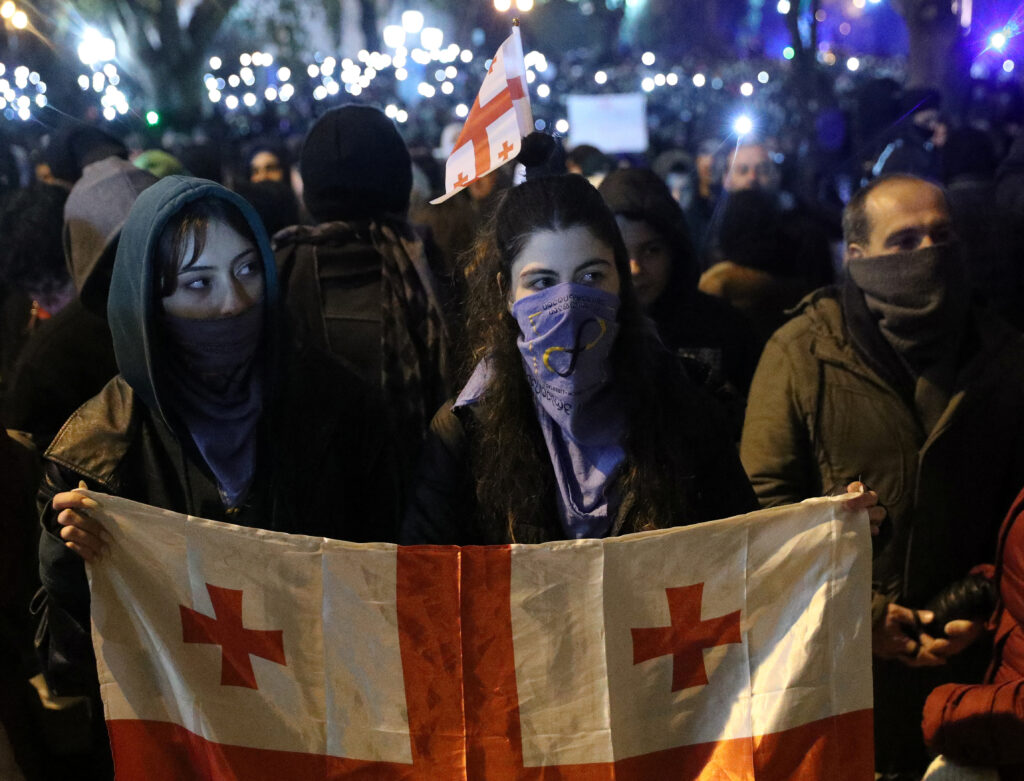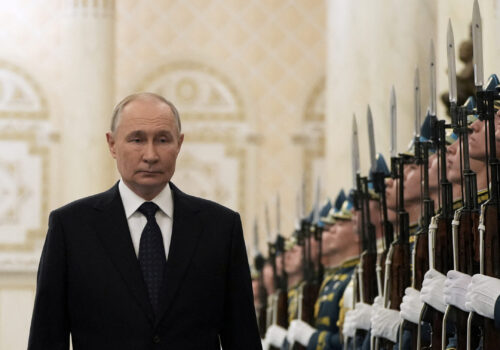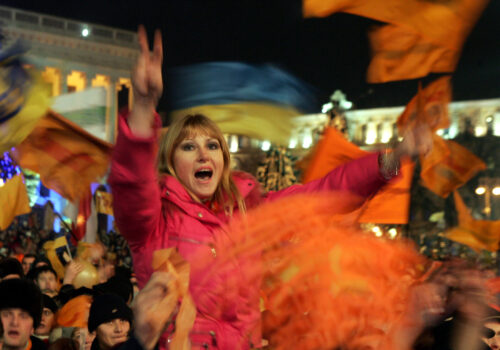Huge crowds have taken to the streets of Tbilisi and other Georgian cities in recent days to protest the government’s November 28 decision to freeze accession talks with the EU. This latest wave of protests comes following weeks of unrest in the wake of the country’s controversial October parliamentary election, which opposition parties and independent observers say was marred by widespread fraud.
The announcement of a freeze in the country’s EU membership bid coincided with a European Parliament resolution denouncing Georgia’s parliamentary election as “neither free nor fair” and calling for a rerun of the vote under international supervision. The resolution strongly condemned “Russia’s systematic interference in Georgia’s democratic processes,” and criticized policies implemented by the ruling Georgian Dream party as “incompatible with Georgia’s Euro-Atlantic integration.”
Opponents accuse the Georgian authorities of violating the Georgian Constitution, which mandates integration into European and Euro-Atlantic structures. The decision to put the EU accession process on pause has sparked widespread anger and dismay throughout Georgian society, where a majority have long favored closer ties with Europe. Polls indicate that around 80 percent of Georgians support the country’s EU integration.
Protests erupted as soon as the decision to freeze EU talks was announced, with large numbers of people flocking to the center of the Georgian capital to defend against what many see as an attack on their country’s democratic system and European future. The authorities have reacted by ordering a hard line response that has included the use of water cannons and tear gas against protesters along with the arrest of prominent opposition figures and multiple incidents of heavy-handed policing. Security forces are accused of deliberately targeting journalists and attacking protesters seeking to record evidence of excesses.
Stay updated
As the world watches the Russian invasion of Ukraine unfold, UkraineAlert delivers the best Atlantic Council expert insight and analysis on Ukraine twice a week directly to your inbox.
The protests currently taking place across Georgia are the latest episode in an extended period of anti-government unrest that began last year when the ruling Georgian Dream party attempted to pass Russian-style foreign agent legislation targeting civil society. Protests then resumed in the aftermath of the parliamentary election in October. Many in Tbilisi are now comparing current events to the April 1989 protests that were crushed by the Soviet authorities, sparking Georgia’s independence movement. There have also been widespread comparisons with Ukraine’s two post-Soviet Maidan revolutions in defense of the country’s fledgling democracy and European choice.
Some Georgian government officials are siding with the protesters, with hundreds signing an open letter condemning the suspension of EU accession talks. A number of Georgian ambassadors and senior officials including Deputy Foreign Minister Teimuraz Jandzhalia have resigned in protest. Meanwhile, schools and universities across the country have halted classes amid signs of a growing civil disobedience campaign.
The protests have also attracted considerable international support. In a November 29 statement, US Helsinki Commission leaders expressed solidarity with the Georgian people while condemning the government crackdown and declaring the Georgian authorities “illegitimate.” Other countries have issued similar statements or imposed sanctions measures on Georgian Dream officials linked to violence against protesters.
Eurasia Center events

The mounting confrontation in Georgia has potentially far-reaching implications for the wider region. Critics of the Georgian Dream authorities accuse the party of seeking to turn their country away from Euro-Atlantic integration and return Georgia to the Russian sphere of influence. They argue that Georgia is a key battleground in the struggle between the democratic world and the emerging axis of authoritarian nations led by Russia and China.
If Moscow is able to return Georgia to the Kremlin orbit, this could have grave consequences for neighboring Armenia, which has sought to deepen ties with the West amid disillusionment over Russia’s failure to support the country during its recent war with Azerbaijan. It would also send a powerful message to other countries looking to turn away from Moscow at a time when Russia is waging the largest European war since World War II in Ukraine over Kyiv’s European aspirations.
The Georgian Dream authorities reject accusations that they are steering the country away from Europe and back toward Moscow. During the recent parliamentary election campaign, they focused on messages of peace and stability while claiming to being shielding Georgia from Ukraine’s fate. However, the sheer scale of the current protests suggests that a large percentage of Georgians reject the idea of securing peace at the expense of their most basic human rights and democratic freedoms.
With the opposition movement gaining momentum, much may now depend on the role of the international community. Protest leaders will be hoping that the US, EU, and other Western countries impose tougher sanctions on Georgian Dream officials while increasing their support for Georgia’s independent media and civil society. As they mull their response to events in Georgia, Western officials will be well aware of the high stakes involved. The outcome of the protests will likely define Georgia’s future and shape the geopolitical climate in the southern Caucasus and beyond for years to come.
Ana Lejava is a policy associate at the Georgetown Institute for Women, Peace, and Security.
Further reading
The views expressed in UkraineAlert are solely those of the authors and do not necessarily reflect the views of the Atlantic Council, its staff, or its supporters.

The Eurasia Center’s mission is to enhance transatlantic cooperation in promoting stability, democratic values and prosperity in Eurasia, from Eastern Europe and Turkey in the West to the Caucasus, Russia and Central Asia in the East.
Follow us on social media
and support our work
Image: Supporters of Georgia's opposition parties hold a rally to protest against the new government's decision to suspend the European Union accession talks and refuse budgetary grants until 2028, in Tbilisi. December 1, 2024. (REUTERS/Irakli Gedenidze)




